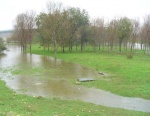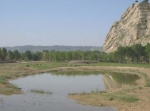Case study:Vallacuera Ravine. Removal of a dyke: Difference between revisions
No edit summary |
No edit summary |
||
| Line 23: | Line 23: | ||
}} | }} | ||
{{Image gallery}} | |||
{{Case study image | |||
|File name=052 Barranco de Vallacuera.jpg | |||
|Caption=Aerial view of Vallacuera ravine | |||
}} | |||
{{Case study image | |||
|File name=052 Barranco de Vallacuera2.jpg | |||
|Caption=Mouth of the ravine before the actuation | |||
}} | |||
{{Case study image | |||
|File name=052 Barranco de Vallacuera3.JPG | |||
|Caption=Artificial pond in the area | |||
}} | |||
{{Image_gallery_end}} | |||
{{Toggle button}} | |||
{{Toggle content start}} | |||
{{Case_study_subcatchment | {{Case_study_subcatchment | ||
|Subcatchment= | |Subcatchment= | ||
| Line 254: | Line 271: | ||
{{Monitoring_documents}} | {{Monitoring_documents}} | ||
{{Monitoring_documents_end}} | {{Monitoring_documents_end}} | ||
{{Additional Documents}} | {{Additional Documents}} | ||
{{Case study documents | {{Case study documents | ||
| Line 278: | Line 281: | ||
{{Supplementary_Information | {{Supplementary_Information | ||
|Information= | |Information= | ||
}} | }} | ||
{{Case_study_upload}} | {{Case_study_upload}} | ||
{{Toggle content end}} | |||
Revision as of 18:04, 6 September 2013
This case study is pending approval by a RiverWiki administrator.
Project overview
| Status | Complete |
|---|---|
| Project web site | |
| Themes | |
| Country | Spain |
| Main contact forename | Fernando |
| Main contact surname | Mendoza |
| Main contact user ID | |
| Contact organisation | Gestión Ambiental Viveros y Repoblaciones de Navarra, S.A. |
| Contact organisation web site | http://www.gavrn.com/ |
| Partner organisations | |
| Parent multi-site project | |
| This is a parent project encompassing the following projects |
No |
Project summary
The dike built in the 80’s after the canalization works carried out in Arga River was removed to recover the natural floodplain in one of the tributaries’ confluence: Vallacuera stream.
The main objective of this project is to restore the river Arga natural floodplain by removing the dyke and increasing the fluvial territory. There are other secondary objectives: to increase the quality of habitat in Community Interest Areas, with special attention to European mink (Mustela lutreola); creating new habitats for otter (Lutra lutra) and European turtle (Emys orbicularis); quality improvement of habitats 92A0 (willow and black poplar plantation) and 92D0 (tamarisk plantation); spatial planning for cattle.
The project has a total budget of 138.840,25€ and is financed by GERVE-LIFE project, INTERREG GIRE project, "Gestión Ambiental, Viveros y Repoblaciones de Navarra, S.A." and Government of Navarre.
Monitoring surveys and results
Lessons learnt
Image gallery
|
Catchment and subcatchmentSelect a catchment/subcatchment
Catchment
Subcatchment
Site
Project background
Cost for project phases
Reasons for river restoration
Measures
MonitoringHydromorphological quality elements
Biological quality elements
Physico-chemical quality elements
Any other monitoring, e.g. social, economic
Monitoring documents
Additional documents and videos
Additional links and references
Supplementary InformationEdit Supplementary Information
| |||||||||||||||||||||||||||||||||||||||||||||||||||||||||||||||||||||||||||||||||||||||||||||||||||||||||||||||||||||||||||||||||||||||||||||||||||||||||||||||||||||||||||||||||||||||||||||||||||||||||||||||||||||||||||||



